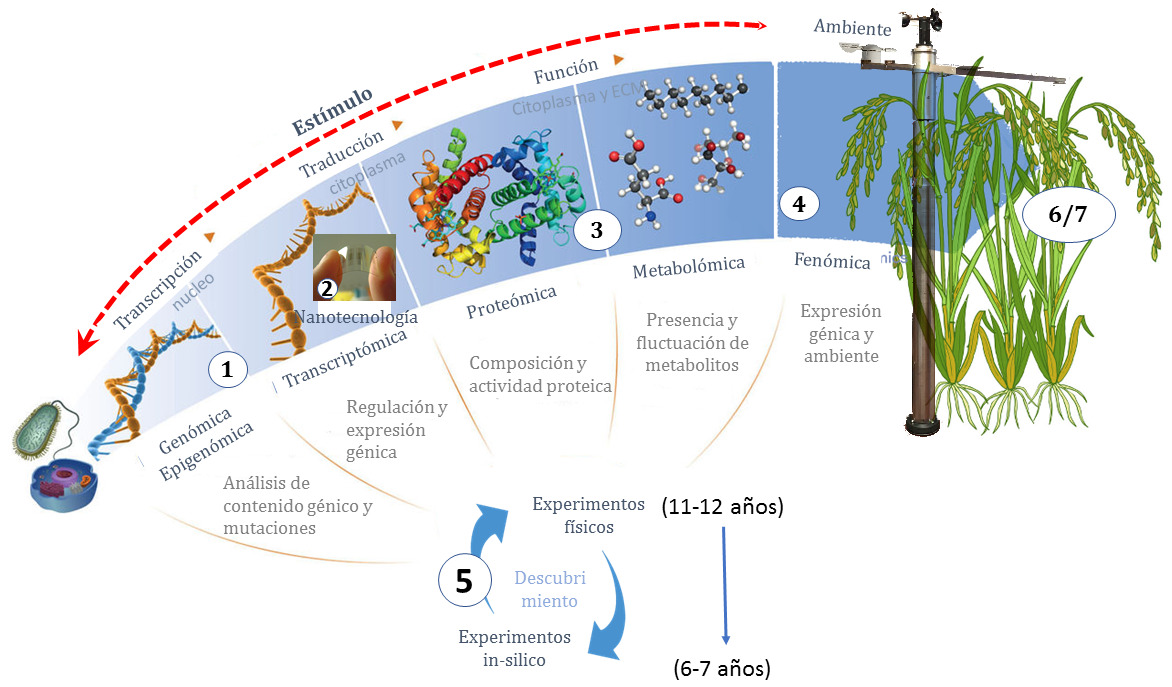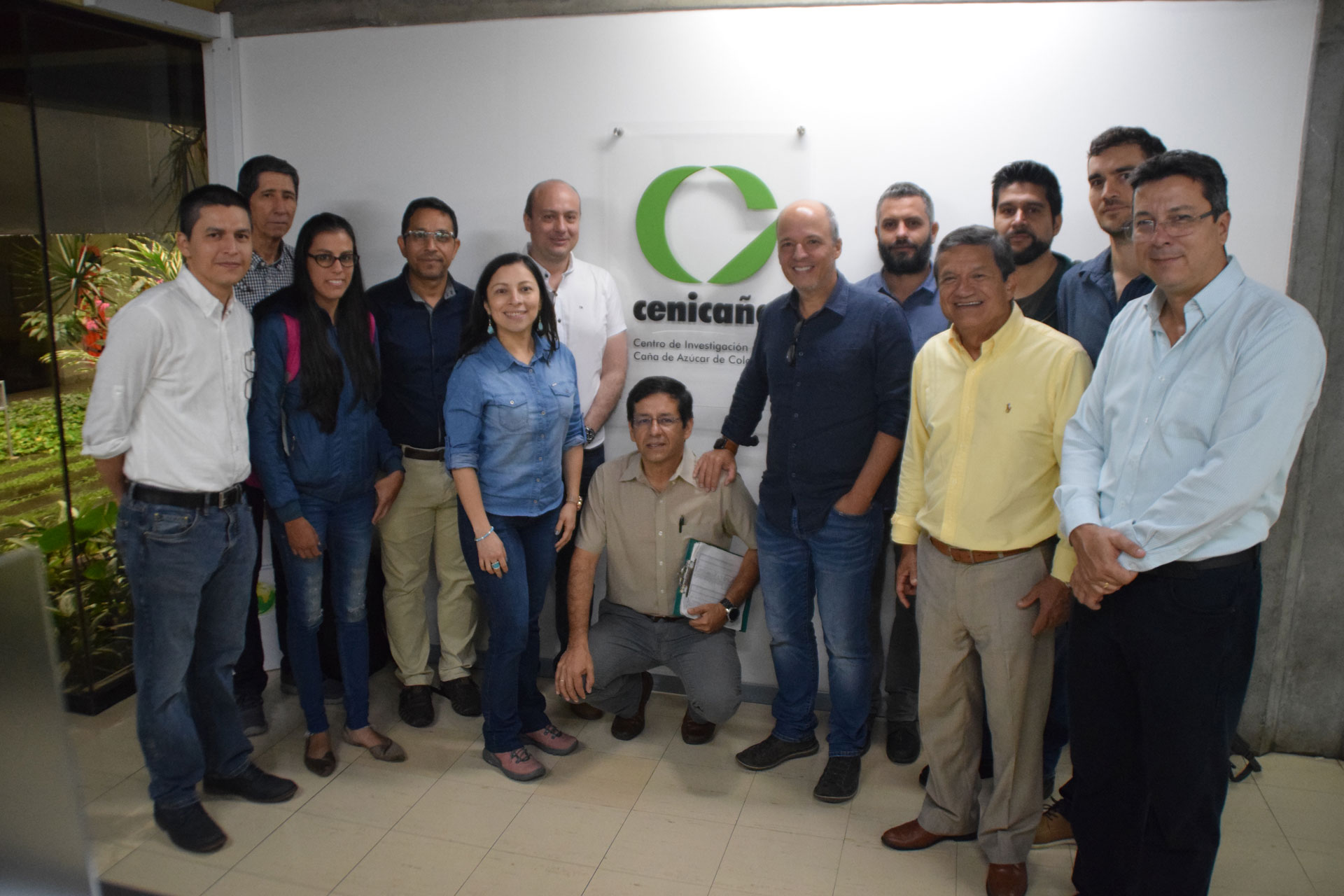Approximately two years ago, a group of 17 entities, between national and international universities, research centers, and technology-based companies, joined forces to find solutions that would contribute to guaranteeing access for all - and at all times - to food since the agricultural production is less polluting.
The alliance was called Multiscale In-silico Optimization of Sustainable Agricultural Crops, but it is known as Omics, and the proposed solution is: to develop and implement infrastructures and varietal improvement strategies, so that crops are more efficient in the use of resources, adapt and produce under non-optimal conditions (biotic and abiotic stresses) and that also contribute to a lower emission of greenhouse gases.
To test the proposed infrastructure and strategy, Omics It will use the experience and knowledge in rice and sugar cane of Ciat and Cenicaña, with the idea that in the end the results can be applied to the improvement of other agricultural crops.

Graphic representation of the In-silico Multiscale Optimization of Sustainable Agricultural Crops (ÓMICAS) research program. Credit: Ómicas Program.
The proposed solution
- Build a physical infrastructure for the adequate and efficient manipulation of experimental populations of crops, under greenhouse or field conditions, until their correct processing in a safe laboratory environment for the extraction and processing of nucleic acids. Project details here.
In other words, the Javeriana University, anchor entity of the Program, is creating a physical space to process samples of plant material, send them to providers of sequencing services, that is, companies dedicated to determining the order of nucleotides in the DNA of a individual, in this case plants, and once the information has been received, analyze it using bioinformatic tools in order to identify the genes that are responsible for some characteristics of interest ”, indicates John Jaime Riascos, biotechnologist at Cenicaña.
This identification of genes is a complement to the classic improvement of crops, allowing greater precision when producing a variety that, for example, responds better to drought conditions or is resistant to pests or diseases.
- Implement a structure to outline the metabolic pathways of simple sugars, organic acids, phenols, flavonoids and starches of plants to know the chemical and biological changes (metabolism) of these to different environmental conditions (for the purposes of the investigation, only environments will be studied wet) with the aim of being more efficient in the use of resources, having greater adaptation to climate change and greater resistance to diseases. Project details here
"For example, it will be possible to associate the concentration of phenols and flavonoids with the resistance of cane varieties to pests or diseases," explains Nicolás Gil, director of the Cenicaña Factory Process Program.
Jhon Jaime Riascos adds: “In the case of sugar cane, it is important to know which varieties have good levels of sugar production (especially sucrose) in humid environments where this characteristic is difficult to obtain. In addition, identifying efficient varieties in the use of nitrogen will minimize or decrease its application since the excessive use of this element, through the work of fertilization, is a great generator of greenhouse gases (GHG). Then, this (phenotypic) characterization of collections of rice and sugar cane germplasm, together with genomic information (from DNA sequencing), will allow us to make useful inferences for genetic improvement ”.
- Identify genetic traits that in the future can be used to develop new varieties (of cane and rice) efficient in the use of resources for less environmental impact. Project details here
- Validate greenhouse gas emissions locally in different commercial varieties under characteristic agronomic management of each production system that favors soil conservation. In this regard, Fernando Muñoz, Cenicaña soil scientist, says: “we are advancing in the characterization of the conditions for the emission of nitrous oxide and methane under the production systems of cane and rice. This will make it possible to relate productivity and GHG emissions and thus be able to identify aspects that allow us to contribute to the innovation and implementation of technologies that comply with the conditions of food security and mitigation of climate change, that promote the development of sustainable systems " . Project details here.
In addition to these four projects, Omics It also includes the development of nanosensors for the measurement of biomarkers and toxins that would give it greater precision. (project details here) and speed to the varietal characterization process; the development of a platform of interconnected devices (IoT) for phenotyping (details the project here) high crop yield; and of an infrastructure and new technologies to simulate varietal improvement processes with computational and computer tools. The other participating entities join forces in these projects.
In total, Omics It brings together seven projects that are progressing in parallel, and although it is still in its infancy, objectives are already being met, such as the identification of varieties of sugarcane with high efficiency in the use of nitrogen. The next stage will be to identify the genes responsible for this efficiency so that they can be introduced to the varietal improvement process of sugar cane.
In addition, the training of undergraduate and postgraduate students from the Javeriana University and the other universities that are part of the alliance is underway, which will strengthen not only this inter-institutional work, but will open the door to more initiatives that contribute to guaranteeing security. food and more sustainable agricultural production, in which the sugar cane agribusiness will be one of the great beneficiaries.

From left to right, Javier Carbonell (back), former director of the Cenicaña Agronomy Program; Jhon Jaime Riascos, co-researcher Cenicaña; Carolina Saavedra doctoral student Javeriana Cali; Jershon López, co-researcher Cenicaña, Ana Claudia Gordillo, Supervision support professional; Edison Suárez, Manager in Science and Technology for Sciences; Fernando Muñoz, principal investigator of project 7 and Senior Researcher of Cenicaña; Andrés Jaramillo Botero, Scientific Director of the Ómicas Program; Álvaro Amaya, former Cenicaña Director; Jorge Finke, principal investigator of project 5, Mauricio Quimbaya, principal investigator of project 1, and Luis Eduardo Tobón, deputy director of Institutional Strengthening of the Ómicas program, Freddy Garcez Obando, General Director of Cenicaña. Courtesy: Ómicas Program.
Visit by a part of the team of the Ómicas Program and the supervision of Minciencias to the experimental station of Cenicaña in 2019.
Scientific Colombia
The union of these entities occurs within the framework of the 'Scientific Colombia', an initiative of the National Government that seeks to improve the quality of higher education, strengthening teaching, research and the internationalization of educational institutions.
Through this program, four alliances were created, which are working networks between national (accredited and non-accredited) and international universities and the productive sector.
Allied entities
Universities:
Pontificia Universidad Javeriana Cali (anchor institution)
Pontifical Javeriana University Bogotá
Icesi University
Universidad de los Andes
Quindio's University
Non-accredited higher education institutions
University of Ibagué
Llanos University
International Higher Education Institutions
University of Illinois
Ghent University
University of Tokyo
California Institute of Technology (Caltech)
Research centers:
Tropical Agriculture Research Center (CIAT)
Research Center of the Sugar Cane of Colombia (Cenicaña)
Industrial sector companies:
National Institute of Agricultural Botany (NIAB)
National Federation of Rice Producers (Fedearroz)
HI-TECH Automation
Intellect












